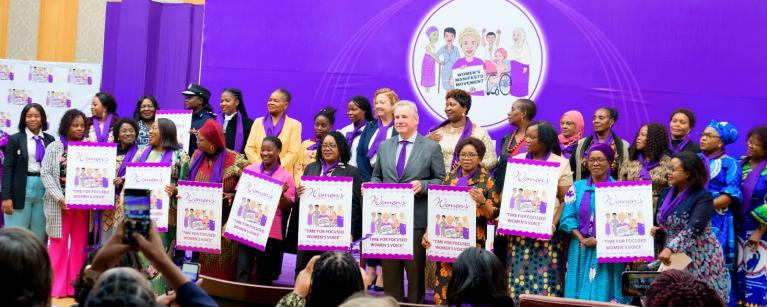On 17th June 2025, women in Malawi painted the city of Lilongwe purple as they launched the 2nd edition of the Women’s Manifesto ahead of 16th September 2025 General Elections led by Oxfam in Malawi and Women’s Legal Resources Centre (WOLREC). The Manifesto consolidates the collective voices of women from diverse backgrounds, experiences, and sectors, ensuring that their demands reflect the pressing issues affecting their daily lives, which leaders are expected to address to improve the position and situation of women and girls in the country. Such leaders include the State President, Government, Political leaders, Private sector leaders, Public sector leaders, Non-State Actors leaders, Religious leaders among others.
“The struggle for gender equality, human rights, and universal freedoms, is as old as creation. It has been a long struggle and continues to defy the best organisational efforts of women despite better coordination and enhanced African and global cooperation on our gender equality agenda.” said Dr Grace Naledi Mandisa Pandor, Keynote Speaker at the launch of the 2nd Edition of the Women’s Manifesto in Lilongwe, Malawi “Women need to play a leading role in changing this dynamic and ensure that they are in the rooms in which decisions are made.”
Speaking during a panel discussion at the event, Ms. Alice Kachere, Chairperson for Rural Women’s Assembly, applauded the development of the manifesto which she said consolidates the views, demands, and concerns of women in Malawi for presentation to different stakeholders for action.
“We had representatives from Oxfam and WORLEC visit us to hear our concerns and how authorities have performed in terms of acting on demands made in the first manifesto. We as rural women are happy that our demands have been put together again in this 2nd manifesto and we are optimistic leaders will take action,” said Ms. Kachere.
Speaking at the event WOLREC Executive Director Maggie Kathewera Banda emphasised that the Women’s Manifesto will serve as a guide for engaging duty bearers, helping them understand the specific demands and expectations of women across the country.
“We will engage presidential candidates from various political parties in Malawi and ensure they sign commitment cards as a pledge to prioritize women’s issues when they assume office,” she said. “Beyond that, we will work with other key institutions—such as the judiciary, immigration, the police, traditional leaders, and women’s groups—to ensure women’s rights are advanced at all levels.”
The women’s manifesto was put together with financial support from the European Union, UK Aid, UN women, and The Malawi Irish Consortium on GBV.
Download attached documents for more information.
